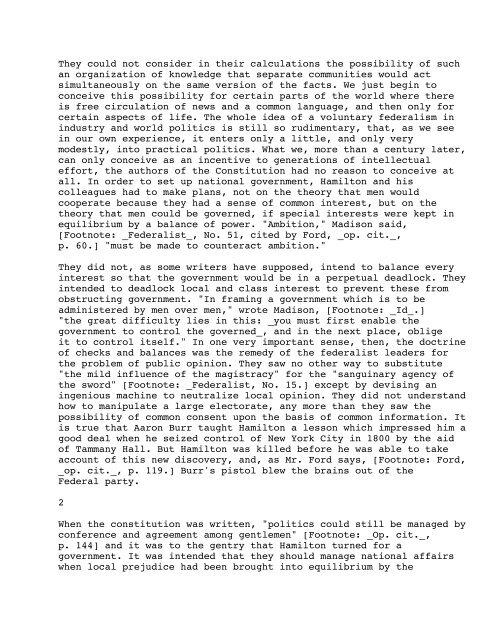PUBLIC OPINION by WALTER LIPPMANN TO FAYE LIPPMANN ...
PUBLIC OPINION by WALTER LIPPMANN TO FAYE LIPPMANN ...
PUBLIC OPINION by WALTER LIPPMANN TO FAYE LIPPMANN ...
You also want an ePaper? Increase the reach of your titles
YUMPU automatically turns print PDFs into web optimized ePapers that Google loves.
They could not consider in their calculations the possibility of such<br />
an organization of knowledge that separate communities would act<br />
simultaneously on the same version of the facts. We just begin to<br />
conceive this possibility for certain parts of the world where there<br />
is free circulation of news and a common language, and then only for<br />
certain aspects of life. The whole idea of a voluntary federalism in<br />
industry and world politics is still so rudimentary, that, as we see<br />
in our own experience, it enters only a little, and only very<br />
modestly, into practical politics. What we, more than a century later,<br />
can only conceive as an incentive to generations of intellectual<br />
effort, the authors of the Constitution had no reason to conceive at<br />
all. In order to set up national government, Hamilton and his<br />
colleagues had to make plans, not on the theory that men would<br />
cooperate because they had a sense of common interest, but on the<br />
theory that men could be governed, if special interests were kept in<br />
equilibrium <strong>by</strong> a balance of power. "Ambition," Madison said,<br />
[Footnote: _Federalist_, No. 51, cited <strong>by</strong> Ford, _op. cit._,<br />
p. 60.] "must be made to counteract ambition."<br />
They did not, as some writers have supposed, intend to balance every<br />
interest so that the government would be in a perpetual deadlock. They<br />
intended to deadlock local and class interest to prevent these from<br />
obstructing government. "In framing a government which is to be<br />
administered <strong>by</strong> men over men," wrote Madison, [Footnote: _Id_.]<br />
"the great difficulty lies in this: _you must first enable the<br />
government to control the governed_, and in the next place, oblige<br />
it to control itself." In one very important sense, then, the doctrine<br />
of checks and balances was the remedy of the federalist leaders for<br />
the problem of public opinion. They saw no other way to substitute<br />
"the mild influence of the magistracy" for the "sanguinary agency of<br />
the sword" [Footnote: _Federalist, No. 15.] except <strong>by</strong> devising an<br />
ingenious machine to neutralize local opinion. They did not understand<br />
how to manipulate a large electorate, any more than they saw the<br />
possibility of common consent upon the basis of common information. It<br />
is true that Aaron Burr taught Hamilton a lesson which impressed him a<br />
good deal when he seized control of New York City in 1800 <strong>by</strong> the aid<br />
of Tammany Hall. But Hamilton was killed before he was able to take<br />
account of this new discovery, and, as Mr. Ford says, [Footnote: Ford,<br />
_op. cit._, p. 119.] Burr's pistol blew the brains out of the<br />
Federal party.<br />
2<br />
When the constitution was written, "politics could still be managed <strong>by</strong><br />
conference and agreement among gentlemen" [Footnote: _Op. cit._,<br />
p. 144] and it was to the gentry that Hamilton turned for a<br />
government. It was intended that they should manage national affairs<br />
when local prejudice had been brought into equilibrium <strong>by</strong> the





